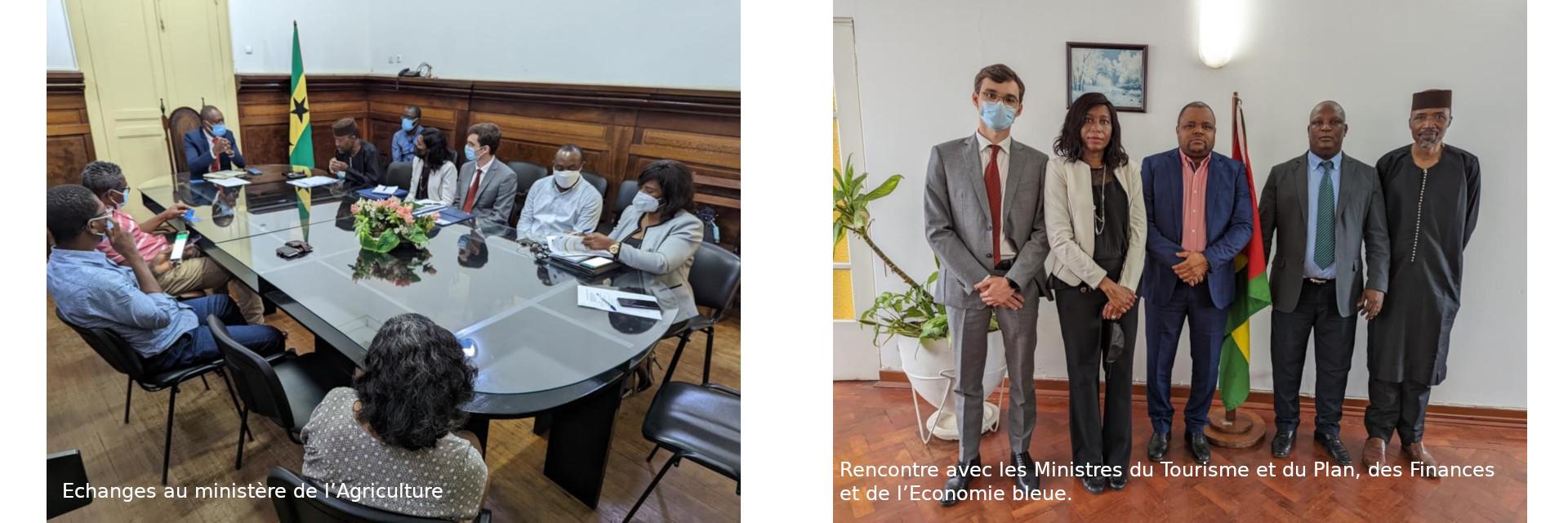From 28 February to 3 March 2022, an ECA SRO-CA team, in cooperation with the African Union Commission and with the financial support of the European Union (EU), organized an awareness mission in Sao Tome on the African Continental Free Trade Area (AfCFTA) and held discussions on prospects of partnerships for the promotion of economic diversification and sustainable development with the Government of Sao Tome and Principe (STP).
In its bid to prepare the country for a successful implementation of the AfCFTA, the mission held a public awareness meeting and discussions on designing a national strategy for the implementation of AfCFTA. The ECA SRO-CA team led by Mr Adama Coulibaly, Senior Economist and Head of the Sub-Regional Initiatives Section, also held bilateral meetings with programme stakeholders from various vital sectors of the archipelago's economy.
Challenges to successful implementation of the AfCFTA for Sao Tome and Principe
The Agreement establishing the African Continental Free Trade Area (AfCFTA), signed in Kigali (Rwanda) on 21 March 2018, entered into force on 30 May 2019 after the deposit of the 22nd ratification instrument. The start of implementation on 1 January 2021 marked the effective achievement of one of the major projects of the first ten-year programme of the African Union's Agenda 2063, as part of strengthening regional integration through trade.
The purpose of the awareness meeting was to discuss with experts from member structures of the AfCFTA Negotiations Committee and from stakeholder structures in the implementation of trade policies and strategies, including the Ministry of Trade, the Ministry in charge of Industry, the Ministry of Planning, Finance and the Blue Economy, Customs authorities, and the private sector in order to inform the strategy formulation.
The meetings dealt with the assessment to be carried out, mainly on the macro-economic framework, the tools and institutional frameworks for trade promotion, the risks and opportunities of production and diversification according to the sector-based approach as well as issues of financing. They also discussed trade facilitation, production promotion and economic diversification of the country, according to the value chain approach. Cross-cutting and no less important issues such as the environment, climate change, technology, infrastructure and gender were also addressed.
Although the positive impact of AfCFTA on African economies seems obvious, the Sao Tomean Minister of Tourism did not hesitate to point out the risk of a substantial drop in proceeds from import taxes. Reacting to this concern, the ECA delegation pointed out that overall customs revenues would decline, but only moderately in the short term, to the tune of 1 to 3%. Moreover, the deficit could be abundantly offset by revenues from increased intra-African trade as well as from reduced import costs resulting from dependence on European Union countries, especially Portugal. In addition, the delegation mentioned an adjustment facility set up to provide short- and medium-term financing to vulnerable countries.
Bilateral meetings were held with stakeholders of Sao Tomean economic and commercial development and involved the Ministry of Planning, Finance and the Blue Economy, the Minister of Agriculture, Customs, the National Institute of Statistics, the RC and UNDP.
Discussions with the Ministry of Finance focused on possibilities for long-term collaboration which, beyond the formulation of the national strategy to implement the AfCFTA Agreement, could include, among others, technical assistance and capacity building for the ministry and for customs and trade officials. For its part, ECA SRO-CA laid particular emphasis on the possibility of transforming STP into a centre of attraction and a maritime hub. It also discussed the modus operandi of the inter-ministerial committee responsible for implementing the AfCFTA.
During the meeting with the Ministry of Agriculture, the ECA delegation recalled the importance of investing in major and innovative infrastructure, in order to transform this sector which is totally dependent on imported seeds and other inputs. Subsequently, the strategy should ensure a better promotion of Sao Tomean agriculture by leveraging its 100% organic nature.
Given the importance of data in crafting a development policy, the ECA seized the opportunity to meet with the National Institute of Statistics (NIS). The meeting identified the need for further cooperation between the two entities, as well as a link between NIS and other institutions in order to build on local skills and reduce dependency.
The mission was also an opportunity to meet with officials of the United Nations system, who are currently updating the "United Nations Sustainable Development Cooperation Framework" for STP. The ECA intends to participate in designing the plan so as to highlight therein issues of economic diversification, structural transformation and regional integration.
The mission is part of a long process of ECA support to Sao Tome and Principe. It marks a decisive turning point in the archipelago’s implementation of the AfCFTA. In the next few days, a series of virtual and in-person meetings are planned to successfully implement this project which will undoubtedly reshape the archipelago’s trade and sustainable development outlook.
Media Contact
Lot Tcheeko, Knowledge Management Officer
United Nations Economic Commission for Africa
637, rue 3.069, Quartier du Lac, Yaounde, Cameroon
Tel: +237 222504321 E-mail: tcheeko@un.org

